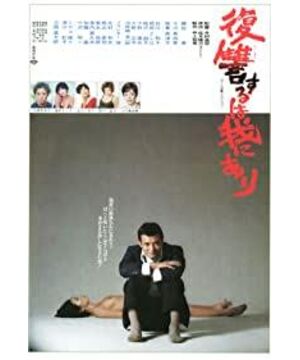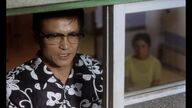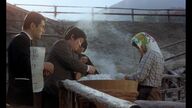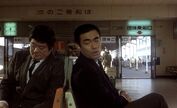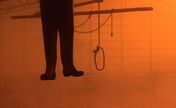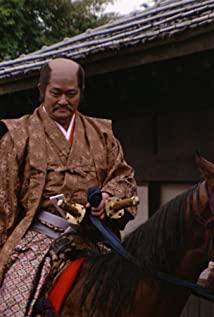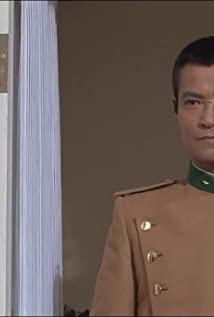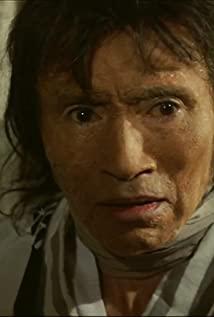The true face of man can only be discerned when he faces his desires.
In the face of desire, reason and religion are so pale and powerless.
---Kavkalu (kavkalu)
reason and desire. In the real world, the value of sex often overrides the holiness and transcendence of religion.
When the father-in-law's hands slowly rubbed the daughter-in-law Kazuko's breasts, when we witnessed the daughter-in-law's ambiguous and contented expression. Please stop all ideas. There were only two people at that moment, just the opposite of two adults.
Both the giving and the being given are complicit in desire, and the mist of the hot spring conceals the moral embarrassment. The trickling rain covered the frantic heart sounds of the two.
At that moment, the Virgin disappeared; at that moment, there were only natural children. They are two flesh and blood people who were expelled from Eden, they are all speechless.
"Vengeance is with me", a social issue film about the real incidents of serial homicides shot by Masahei Imamura in 1979. In performance, the film only calmly narrates Etsu's criminal process. But the inner director is questioning society: when authority (father's self) is subverted, when religion is emptied, who is left to save the helpless.
In the film, it is very important for the father-in-law to kill the dog. The cruelty of killing the dog is a metaphor for the irrationality of desire and the cruelty of human nature. This is often the prerequisite for tragedies. The most terrifying thing about a person is not what he has done to the world, but the individual's abandonment of the self. The root cause is often related to childhood and genes. The tendency to violence is often not something that the self can restrain rationally. Sometimes killing people and surpassing goods is no longer for livelihood or revenge, sometimes it is just a habit, like eating and sleeping. This total disorder was beyond the grasp of the young and energetic Imamura Masahira. Some people said: This is "complexity in structure and the falsification of character psychological analysis". However, looking at the whole drama, the film can only list the criminal process of Enojinyan like a running account, and there is no evaluation, and there is no way to evaluate it. There is only one process after another. Indifferent and long, waiting for the audience to fill. The motives of Enojinyan's crime are ambiguous, psychological analysis is out of order, and psychological motives are not supported.
In the film, there is a detail about childhood. When the navy came to conquer the ship, his father refused because of unfairness. Enotsu witnessed his father being beaten by soldiers, and the young Enotsu rushed towards the conquest of the ship with a wooden stick. Soldiers, this is the beginning of his violent tendency (the specific reason can only be explained by the current genetic theory. Of course, Masahira Imamura could not analyze it because this is a real case). When the police wanted to punish Enotsu, his father gave up the confrontation with the soldiers because of his love for his son, and gave up the ship.
The supremacy of faith has disappeared at this moment. The original human nature (family affection) dominates everything. The spiritual world is often just a way for people to relieve pressure, but the heart is often empty and helpless. This is very different from Gandhi's realm.
In the next shot, at night, Enotsu said to his mother angrily by the seaside: "Father is a coward...he lost." This strong sense of rebellion is the beginning of his revenge. Is the road of no return a function of society or of genes?
When Enotsu was serving his sentence, the ambiguity between father-in-law and daughter-in-law was a kind of human exile and origin. It challenged the orthodox morality of society. What do you choose between demand (instinct) and restraint (rationality or morality)? Divinity? Reasonable? !
During a prison visit, the director used the iron fence in the visiting room to metaphor the opposition and separation of father-in-law, daughter-in-law, and Etsu. The triangle formed by Etsuko, whose backs are facing us, Katsuko who looks terrified, and his father who declares morality, explains the relationship between the three.
In order to cover up, Enotsu's father remarried Kwon Enotsu. For the same purpose, the father-in-law asked Kazuko to seduce Kazuko to subdue his own raging desires. This kind of despicableness comes from a believer, from which we can see the director's aversion to foreign religions, which in turn points to the occupation of Japan (a scene where the US military molested women was inserted in the movie).
After her release from prison, Enotsu's mother told her father's "pumping dust" is a sign of her helplessness, and it is also a complex of people's desire to use his power to solve problems. It reduces the relationship between people to "killing with a knife." This is not the despicable mother, it is the lack of all human beings.
The mother is her, and the mother is all of us!
A scene in which Enotsu returns home and asks his teacher for crimes. The director used to travel through the cramped space of Japanese architecture to foretell the alienation of human beings. The camera passes under the crotch of Enotsu Iwa (this shot reminds me of a scene where the gangsters were threatened by the Chinese film "Goddess" in the 1930s) and Kazuko of Byvo said: Welcome home. This subordinate status is exactly the basic content of the Japanese husband's power. Thus named the low status of Japanese women, they are just masculine playthings.
Immediately after confronting a scene, the director used the cicadas and the curling smoke outside the window, and the shaking of the curtain on the door to highlight the inner separation and alienation of the characters.
There is no good person in the film in a moral sense. They all have this and that kind of shortcomings, but it is this kind of shortcoming that is true and credible. Human morality and the so-called sense of justice all happen under certain conditions. Without these external conditions, human nature is always on the edge of beasts.
While the film depicts him killing and deceiving, it also depicts his sexual relationship with some women. This description is based on sociology and psychology. A man must use his power to prove his social existence. His method is not only power, but also the penetration of women. The swelling penis becomes the third hand of “power”. This kind of conquest completes self-satisfaction from sex to spirituality. The core of crime is often the inability to be complacent with certain needs.
The film is used to describe the relationship between Enotsu and Achun, the proprietress of the small hotel, and demonstrates the ugliness of human nature through these. The gambling mother-in-law helps her son-in-law monitor her daughter for the sake of "money", and also matches the relationship between Etsu and her daughter for the sake of money... Humanity issues like these are everywhere in the film. This is not a question of "evil" and "good", it is the connotation of "nothing" in human nature. Worrying starts with a thought, and in the same way, worrying also ends with a thought.
Enotsu always pretends to be a professor or a lawyer when he cheats. On the one hand, it is convenient to cheat in the future, but his assumption of his role has his own psychological foundation. If a person does not get the respect he deserves in society, some people will conceal their vulnerability and low self-esteem by "masking" their roles, and achieve virtual victory. This is the underlying reason for Enotsu's strong desire for women.
There is also a scene where Kazuko and her father-in-law talk in the bathroom, which is very good. The director uses the projection of water waves on the bathroom and the sound of water to show the conflict between father-in-law's inner desires and taboos, and uses eyes to convey each other's heartfelt words and helplessness. The end of the scene was the father-in-law's sentence: "The phone rang, go and pick it up!" This line suddenly brought the two horny people back to reality. At the same time, it also warned the audience that people cannot be separated from social relations. People are sometimes just slaves to society in the recurring relationship! !
Someone said: "The protagonist Xia Jinyan kills almost none of the people he hates. The mother of the hotel boss in the film makes it clear: You kill someone you don't hate." But is the world just simple love and hate? ? Modern social criminology tells us that the motive of a serial killer is often just a habit or the pleasure of breaking free after a certain desire is suppressed, which has nothing to do with the moral definition. The world has never been simple between good people and bad people. The gray in between is our human instinct as an animal. Everyone knows that vertebrates are instinctively aggressive. Outside of our rationality (rationality is the product of enlightenment, however, enlightenment cannot dominate all people, like Etsujin), it will jump out and hurt others at a certain moment. Harm yourself.
In the film, when the mother-in-law and Enotsu talk about murder, the director uses a subjective lens to foretell Enotsu's final outcome: a person who asks questions.
But he "killed" A Chun in the end, and he also completed his life. On Huangquan Road, there was a guy named A Chun waiting, waiting to complete the formation of a birth path, and complete the finite to infinite possibilities. At that moment they are the real selves.
After that, life no longer has meaning, after that, just waiting for death to happen.
The film returns to the scene of interrogation. Etsu’s smile and arrogance are creepy. What’s more shocking than talking about death and contempt for life.
Man, a person who abandons himself, no longer obeys any sociological definition. It The revenge and hatred is the entire human system and theory of value, as well as himself.
"I don't know" Is this all Etsu's criminal motive? Motivation is always the speculation of later generations, and the phrase "others are hell" [Note 2] is the meaning of the whole composition of the world.
When father and son meet again, the swaying cross is so funny, this scene can be compared with the priest "redeeming" the gadfly in "Gadfly". Religion, secular "religion" is always only "a tool to paralyze the people." [Note 3]
Every director has a process of growth, and everyone is constantly surpassing the old self, and Imamura Shohei is no exception. From "Vengeance to Me" to "Eel", I have seen the growth of a director. This is the result of the increase in age and education. This is the only way for a master to go from the outside to the inside.
The film seems to tell us that when we are separated from social relations, there are only two naked people in the world. The title of the film [Note 1] is from the "Bible", and who is the subject of revenge? Enotsu? God? Or is it social value theory? ! And I always believe that the existentialism that held the right to speak in the world in the 1960s and 1970s more or less affected the worldview and narrative logic of directors in that era.
A large number of shots in the film were shot at a sitting height. Such shots are also the favorite of Japanese film master Yasujiro Ozu. Such a camera has a deep Japanese cultural meaning, cramped and restrained. This kind of repression is the whole core of Japanese culture ever since.
In this film, we saw an image often used by Masahira Imamura: eel. It is a symbol of vitality, but also a symbol of destiny. No matter where a person flees, he will return to his own destiny. This is the case in "Vengeance is with me" and even more so in "The Eel". Enotsu's evaluation of his father is: Hmph, fake Taoism! This is the contempt of a child, this is the cry of a life that is about to end!
Whose children are we? !
Who is our father? !
God? ! Or Satan? !
There is no answer, life has always been a process from nothing to nothing... the
ashes were thrown into the air, and the director let it stay in the air, nothing more!
Damn it! Philosophy and meaning!
…… ……
OSAMA KAVKALU
Friday, June 13, 2003 at 15:31
Pudong Jackdaw Abode in the early summer afternoon. Today is the day when YOKO ended SARS isolation in the "Xizheng". So remember it.
[Note 1] The Lord declared through the mouth of Moses, "The revenge is with me." "(A volume in the Christian Bible "Old Testament, Leviticus") 19:18."
[Note 2] The word Sartre means that others are unknowable.
[Note 3] Saying Marx
View more about Vengeance Is Mine reviews


